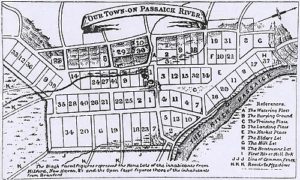| Where might this town be? |
 |
| You:
|
Historian:
In New Jersey – near the Passaic River.
|
| How many lots are there? Did any owner have more than one plot? |
| You:
|
Historian:
There are a total of 64 lots. Owners # 1,11, 20, 2.
|
| Why might someone have more than one plot? |
| You:
|
Historian:
Someone with more power, respect, or money. Robert Treat owned #1. He was seen as the group organizer, and the town agreed he could have more space.
|
|
What did the town have besides a place for homes?
|
| You:
|
Historian:
See the “references” on the map.
|
| What would a “Watering Place” be used for? |
| You:
|
Historian:
Livestock, horses.
|
| Where would these animals be kept? |
| You:
|
Historian:
In the meadows.
|
| What is a “common” fence? |
| You:
|
Historian:
“Common” means belonging to a community at large such as the town common. The town, rather than an individual is responsible for its upkeep.
|
| Why is a fence needed? |
| You:
|
Historian:
To keep the animals out of town.
|
| Find the “Landing Place.” (D) What is a landing place used for? |
| You:
|
Historian:
To bring in or send out goods and to provide alternate water route for travel.
|
| Is this a public or private space and how can you tell? |
| You:
|
Historian:
Public – off the owned plot, accessible by a road.
|
| If it had been on a private lot, what would be the advantages or disadvantages of this for the owner? |
| You:
|
Historian:
The owner could charge a use fee, but would have to provide upkeep of space.
|
| What symbols are used on this map? |
| You:
|
Historian:
Short lines for meadow area, closer lines for wooded hills, river, sloped area to river, numbers and letters.
|
| What is “G” lot? |
| You:
|
Historian:
Mill lot.
|
| What would a mill be used for? |
| You:
|
Historian:
Process timber in this case.
|
| Why is this lot a good place for a mill? |
| You:
|
Historian:
Near roads and wooded area for direct access. On “Ford River Mill Brook” I to give direct access to the river to send timber away for sale.
|
| Why would a mill owner want to have a land plot in the wooded hill area? |
| You:
|
Historian:
To have easy access to timber for sale.
|
| Find the market place. What are the advantages of its location? |
| You:
|
Historian:
An open area to have room to display wares, accessible by many roads, and close access to river.
|
| Find “The Burying Ground” cemetery. Where are burying grounds cemeteries located today? Why are they located there? |
| You:
|
Historian:
They’re usually outside city limits for health and space reasons.
|